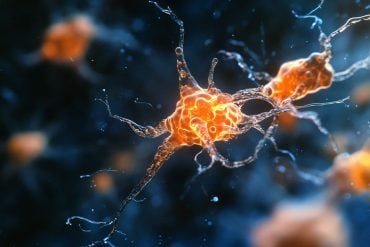Summary: Researchers report alcohol produces the same neural and molecular changes as drugs that have proven to be rapidly effective antidepressants.
Source: Wake Forest Baptist Medical Center.
Can having a few drinks help people with clinical depression feel better?
Yes. At least in terms of biochemistry.
In a study published in the current issue of the journal Nature Communications, researchers found that alcohol produces the same neural and molecular changes as drugs that have proven to be rapidly effective antidepressants.
“Because of the high comorbidity between major depressive disorder and alcoholism there is the widely recognized self-medication hypothesis, suggesting that depressed individuals may turn to drinking as a means to treat their depression,” said the study’s principal investigator, Kimberly Raab-Graham, Ph.D., associate professor of physiology and pharmacology at Wake Forest School of Medicine, part of Wake Forest Baptist Medical Center. “We now have biochemical and behavioral data to support that hypothesis.”
This, however, does not at all suggest that alcohol can be regarded as an effective treatment for depression.
“There’s definitely a danger in self-medicating with alcohol,” Raab-Graham said. “There’s a very fine line between it being helpful and harmful, and at some point during repeated use self-medication turns into addiction.”
In their study using an animal model, Raab-Graham and her colleagues found that a single dose of an intoxicating level of alcohol, which has been shown to block NMDA receptors (proteins associated with learning and memory), worked in conjunction with the autism-related protein FMRP to transform an acid called GABA from an inhibitor to a stimulator of neural activity. In addition, the research team found that these biochemical changes resulted in non-depressive behavior lasting at least 24 hours.
This study demonstrated that alcohol followed the same biochemical pathway as rapid antidepressants in the animals, while producing behavioral effects comparable to those observed in people. In recent years, single doses of rapid antidepressants such as Ketamine have proven capable of relieving depressive symptoms within hours and lasting for up to two weeks, even in individuals who are resistant to traditional antidepressants.

“Additional research is needed in this area, but our findings do provide a biological basis for the natural human instinct to self-medicate,” Raab-Graham said. “They also define a molecular mechanism that may be a critical contributor to the comorbidity that occurs with alcohol use disorder and major depressive disorder.”
Co-authors of the study are Chelcie F. Heaney, Ph.D., of Wake Forest Baptist and Sara A. Wolfe, M.A., Emily R. Workman, M.A., Farr Niere, Ph.D., Sanjeev Namjoshi, B.S., Luisa P. Cacheaux, Ph.D., Sean P. Farris, Ph.D., Michael R. Drew, Ph.D., Boris V. Zemelman, Ph.D., and R. Adron Harris, Ph.D., of the University of Texas at Austin.
Funding: The study was supported by an National Institutes of Health/National Institute on Alcohol Abuse and Alcoholism pilot grant provided by the Integrated Neuroscience Initiative on Alcoholism; National Science Foundation grant I0S-1355158; Department of Defense USAMRMC Award W81XWH-14; NIA/NIAA grants AA012404, AA013517 and 5T32AA007471; and NSF Postdoctoral Research Fellowship in Biology awards DBI-2306528 and DBI-1103738.
Source: Marguerite Beck – Wake Forest Baptist Medical Center
Image Source: NeuroscienceNews.com image is in the public domain.
Original Research: Full open access research for “FMRP regulates an ethanol-dependent shift in GABABR function and expression with rapid antidepressant properties” by Sarah A. Wolfe, Emily R. Workman, Chelcie F. Heaney, Farr Niere, Sanjeev Namjoshi, Luisa P. Cacheaux, Sean P. Farris, Michael R. Drew, Boris V. Zemelman, R. Adron Harris and Kimberly F. Raab-Graham in Nature Communications. Published online September 26 2016 doi:10.1038/ncomms12867
[cbtabs][cbtab title=”MLA”]Wake Forest Baptist Medical Center. “Alcohol Shown to Act in Same Way as Rapid Antidepressants.” NeuroscienceNews. NeuroscienceNews, 29 September 2016.
<https://neurosciencenews.com/alcohol-antidepressant-action-5151/>.[/cbtab][cbtab title=”APA”]Wake Forest Baptist Medical Center. (2016, September 29). Alcohol Shown to Act in Same Way as Rapid Antidepressants. NeuroscienceNew. Retrieved September 29, 2016 from https://neurosciencenews.com/alcohol-antidepressant-action-5151/[/cbtab][cbtab title=”Chicago”]Wake Forest Baptist Medical Center. “Alcohol Shown to Act in Same Way as Rapid Antidepressants.” https://neurosciencenews.com/alcohol-antidepressant-action-5151/ (accessed September 29, 2016).[/cbtab][/cbtabs]
Abstract
FMRP regulates an ethanol-dependent shift in GABABR function and expression with rapid antidepressant properties
Alcohol promotes lasting neuroadaptive changes that may provide relief from depressive symptoms, often referred to as the self-medication hypothesis. However, the molecular/synaptic pathways that are shared by alcohol and antidepressants are unknown. In the current study, acute exposure to ethanol produced lasting antidepressant and anxiolytic behaviours. To understand the functional basis of these behaviours, we examined a molecular pathway that is activated by rapid antidepressants. Ethanol, like rapid antidepressants, alters γ-aminobutyric acid type B receptor (GABABR) expression and signalling, to increase dendritic calcium. Furthermore, new GABABRs are synthesized in response to ethanol treatment, requiring fragile-X mental retardation protein (FMRP). Ethanol-dependent changes in GABABR expression, dendritic signalling, and antidepressant efficacy are absent in Fmr1-knockout (KO) mice. These findings indicate that FMRP is an important regulator of protein synthesis following alcohol exposure, providing a molecular basis for the antidepressant efficacy of acute ethanol exposure.
“FMRP regulates an ethanol-dependent shift in GABABR function and expression with rapid antidepressant properties” by Sarah A. Wolfe, Emily R. Workman, Chelcie F. Heaney, Farr Niere, Sanjeev Namjoshi, Luisa P. Cacheaux, Sean P. Farris, Michael R. Drew, Boris V. Zemelman, R. Adron Harris and Kimberly F. Raab-Graham in Nature Communications. Published online September 26 2016 doi:10.1038/ncomms12867






